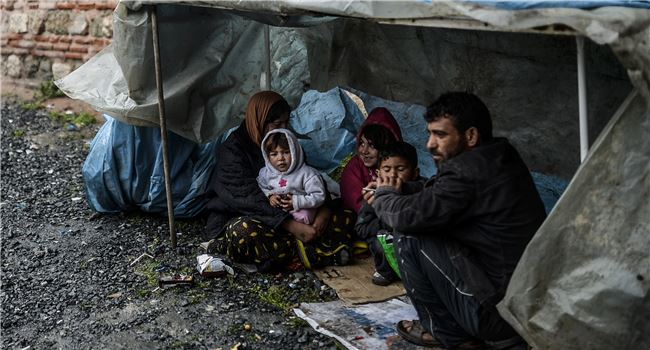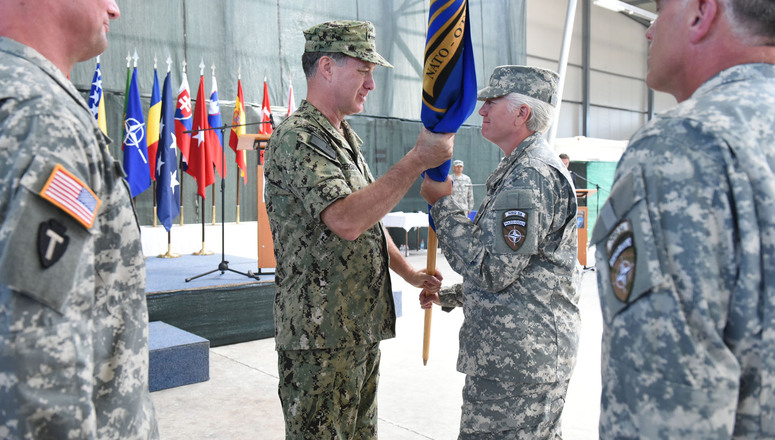
The war in Syria has been a heavy contributor to the steepest rise in displaced people in the past two decades. It is estimated that since the conflict broke out in 2011, over 9 million Syrians have been displaced from their homes – this is nearly half of Syria’s pre-war population. Since 2011, over 2 million of these people have sought refuge outside Syria’s borders. This deluge of refugees poses a real challenge to Syria’s neighbors, paving the way for future instability in the region. So far, neighboring countries have held up fairly well, providing aid and building camps for incoming refugees. Despite these efforts, the burden of care may soon become overwhelming as refugees continue to pour into the camps. According to data from the office of the United Nation’s High Commissioner for Refugees (UNHCR), the Syrian conflict has created more refugees than the war in Kosovo or even the Rwandan genocide.
Though roughly half of all international humanitarian aid to Syria has come from the European Union (EU), the EU is only hosting 4% of all Syrian refugees. Helene Flautre, Co-Chair of the EU-Turkey Joint Parliamentary Committee, warns that though funding is an indispensable part of providing humanitarian aid, it “should not be a substitute for real solidarity to neighboring countries.” This applies particularly to Greece, where EU aid funding has gone towards strengthening the country’s border with Turkey in order to stymie the flow of Syrians trying to get into Europe. Flautre points out that while the EU could have invested more into resettlement or temporary stay options for the refugees, the funding in Greece went largely toward erecting and policing barriers to prevent the refugees from completing their journeys. Tens of refugees have already drowned during failed border crossings on the Aegean Sea, which touches Greece and Turkey.

Turkey, Lebanon, and Jordan are the three primary receiving countries for Syrian refugees, though Iraq and other neighboring areas have also seen large numbers arrive at their borders since the beginning of the conflict. Every host country except for Lebanon immediately began to set up camps for the refugees, often in border towns and in agricultural areas. The Lebanese took a unique approach, providing host families and rental housing options for the newcomers, only starting to register the arrivals from Syria as refugees in January 2013. Of course, not all the arrivals are, metaphorically speaking, in the same boat. While those most in need rely heavily on the generosity of Lebanese friends and humanitarian organizations, those with some savings are sometimes able to begin a new life in Lebanon, renting vacant apartments, finding work, and contributing to the community. The vast majority of the displaced, however, finish their journey in a refugee camp, where in most cases, they must remain until they are able to return home.
In June of 2014, Turkey’s Deputy Prime Minister Besir Atalay estimated that Turkey was hosting over a million displaced Syrians, though less than a fifth of this number are living in designated camps.
The Turkish government set up 22 camps for refugees, spending about $1.5 billion by May of last year. At the start of the conflict in 2011, Turkey initially refused to acknowledge the Syrian arrivals as refugees, instead referring to them as guests. As the crisis expanded, Turkey granted the Syrian “guests” temporary protection status, a widely recognized status that prevents the asylum-seekers from being forcibly repatriated, though they still lack access to the full range of services and safeguards allowed to refugees. In June of 2014, Turkey’s Deputy Prime Minister Besir Atalay estimated that Turkey was hosting over a million displaced Syrians, though less than a fifth of this number are living in designated camps.
 Jordan is home to an estimated 600,000 refugees from the Syrian conflict, spread over a number of border cities and refugee camps such as Za’atari, which has become Jordan’s fourth largest city. Same-day registration is available to new arrivals entering Jordan from Syria, and shelter, healthcare, and some educational opportunities are being provided by local NGOs as well as the UNHCR.
Jordan is home to an estimated 600,000 refugees from the Syrian conflict, spread over a number of border cities and refugee camps such as Za’atari, which has become Jordan’s fourth largest city. Same-day registration is available to new arrivals entering Jordan from Syria, and shelter, healthcare, and some educational opportunities are being provided by local NGOs as well as the UNHCR.
As the conflict in Syria continues, asylum seekers will continue to queue at the borders and wait for something to change. Syria’s neighbors have each taken some steps to accommodate the newcomers, though even that will not be able to keep up with the rising numbers indefinitely. For countries with more porous borders with Syria, such as Lebanon, there is not merely the risk of overcrowding and insufficient resources, but also of the conflict spilling over into previously peaceful territory. Conflicts like the Syrian civil war do not occur in a cultural vacuum, and with the ever-messier combination of rebel groups and rival factions in the region, allowing the problem to fester will only lead to further complications down the road. Until the conflict is resolved, the international community will have to continue to build up the system of humanitarian aid millions of Syrians rely on to survive.




